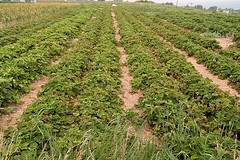When Myrna and Earl Fincher married 53 years ago they began farming their yard “out of necessity”. These days, the Finchers make a living selling their natural generate to restaurants and at the local farmers’ market twice a week for significantly of the year. They had no experience as farmers, but learned by trial and error. Original story right here: faircompanies.com

Ken Rider, an organic grain farmer in Ohio, describes his knowledge in employing organic weed management strategies to control weed outbreaks on Rider Landing.

